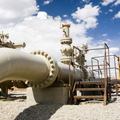Carnegie Mellon Team Finds Exporting Natural Gas Will Not Increase, But Lower Greenhouse Gas Emissions

Researchers at Carnegie Mellon University’s College of Engineering have determined that exporting natural gas to Asia or Europe will not cause increased greenhouse gas emissions. Their findings, detailed in the first peer-reviewed paper to quantify whether exporting liquefied natural gas (LNG) is good for the climate, were recently published in a paper in “Environmental Science and Technology.”
Natural gas, and specifically LNG, has caused a major debate in the U.S. as a potentially cleaner energy source. As domestic natural gas production has increased, it has been questioned whether exporting natural gas in the form of LNG to replace gas in Europe or coal in Asia would result in increased greenhouse gas (GHG) emissions. For the most part, it doesn’t, says the team, which includes Engineering and Public Policy (EPP) and Civil and Environmental Engineering (CEE) Ph.D. student Leslie Abrahams, CEE Assistant Professor Constantine Samaras, EPP Associate Research Professor Mike Griffin and CEE/EPP Professor H. Scott Matthews.
“We went a step beyond just the emissions from exporting the natural gas and looked at how it might be used when it gets to its destination, such as to displace coal or other forms of natural gas,” said Abrahams, the corresponding author. In the majority of the outcomes the researchers considered, they found the most likely outcome is that U.S. energy exports would help reduce global GHG emissions.
There are social costs to the U.S., however. In particular, increased LNG exports, while lowering global GHGs overall, would increase the GHGs emitted by the U.S. due to methane emissions leaked from the upstream production process. In order to further decrease GHG emissions, the U.S. would need to do everything in its power to reduce these leaks.
The paper, titled “Life Cycle Greenhouse Gas Emissions From U.S. Liquefied Natural Gas (LNG) Exports: Implications for End Uses,” has special significance for climate science as As it stands now, the U.S. Department of Energy deems the export of liquefied natural gas to countries that fall under the Free Trade Agreement (FTA) to be in the public interest, meaning that permits for exports to these countries are approved almost automatically. The highest gas prices, however, exist in non-FTA countries, and exporting LNG to these countries is much more difficult.
“There has been some recently proposed legislation in the U.S. to expedite the approval process for permits to non-FTA countries,” Abrahams said. “Our research focused on how allowing these exports would impact GHG emissions.”
To illustrate the importance of the proposed changes, the team quantified the potential economic benefit of increased LNG exports using the Social Cost of Carbon, a metric by which the U.S. government monetizes the estimated impact of energy decision-making.
“Our base case scenario used U.S. LNG to displace coal for electricity generation,” said Abrahams who noted that the scenario resulted in a savings of 550 g/kwh. “That equates to a social savings of $28 per megawatt hour if you consider the net change emissions from coal to natural gas.”
Because the extraction and processing happens in the U.S., however, the carbon emissions from the U.S. specifically increase, so the cost of the increase is $13 per megawatt hour. The paper emphasizes that the social costs, as well as the benefits, should be taken into account when determining whether increased U.S. LNG exports would be beneficial.
###